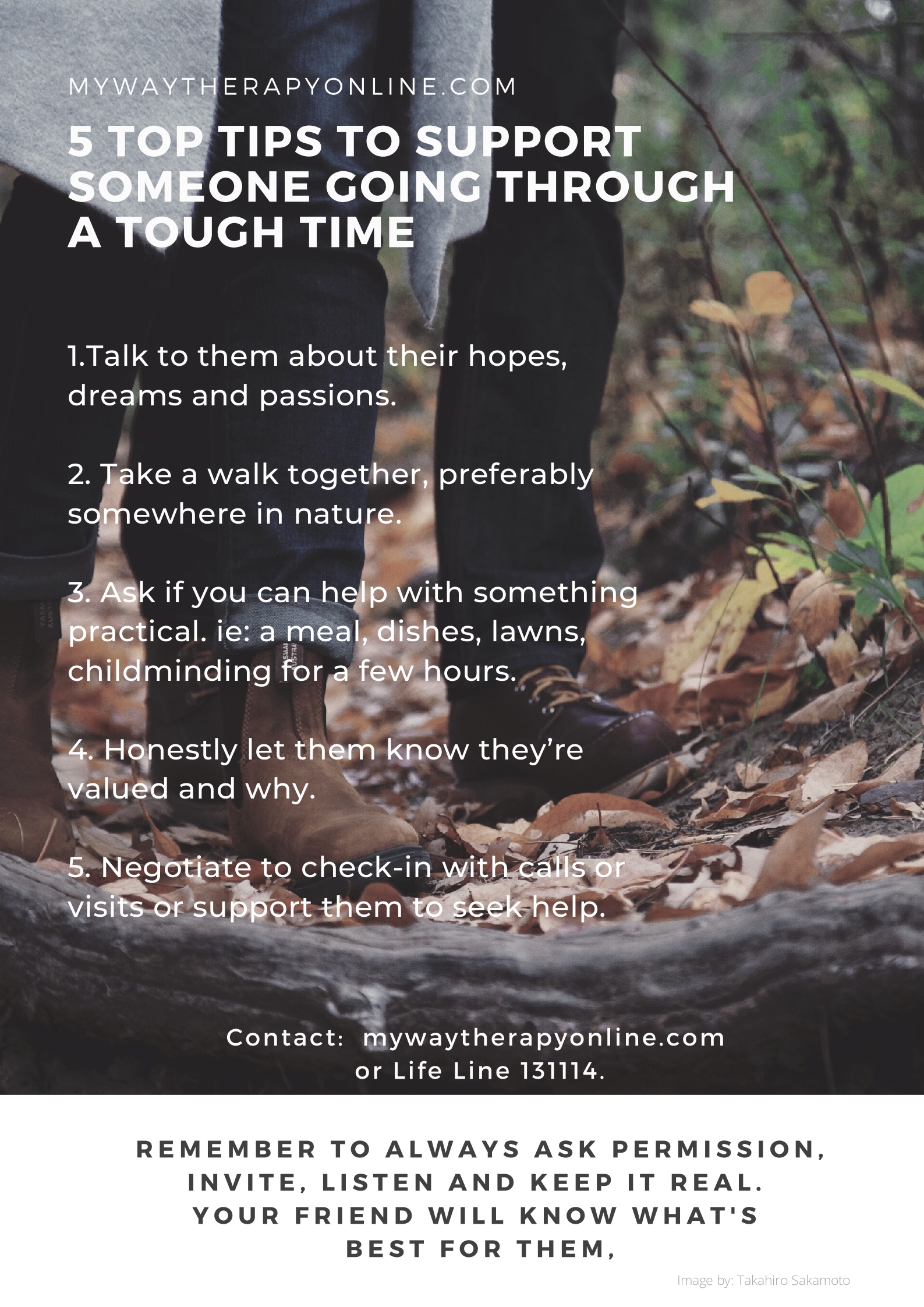INTRODUCTION:
Often we can see that a friend or relative is going through a rough time but we are not sure how we can support them. Here are 5 Tips that we know have been helpful. They are not in any particular order as everyone is different and has different needs so think about what your friend might best respond to.
Remember to always ask permission before offering anything and make your suggestion an invitation. We know that that this can be more effective than giving advice. Your friend will know what’s best for them, so offering choices will get better results as they will feel respected and heard. If a person is depressed or anxious they might need some convincing and if they say no once ask if it’s ok to suggest something another time. Don’t give up on them.
TIP 1: Talk to them about their hopes, dreams and passions.
By supporting friends to reconnect with dreams, hopes and passions during difficult times it can help alleviate some of the quagmire of the challenges and assists in refocussing on what makes living worthwhile. Part of supporting them in this way might be to come up with some small and achievable steps they can work on or you can work together on to move from where they are to where they want to be. Having hope, meaning and purpose in life can be motivating and shifts perspective from their difficulties to their possibilities.
Try not to give advice or problem solve. Be a sounding board and a friend who can listen non-judgementally. Accept them and their situation how it is without trying to fix anything support their strengths and dreams.
TIP 2: Take a walk together, preferably somewhere in nature.
Walking creates a feedback loop between the rhythm of our bodies and our mental state. Walking has many health benefits including; improved memory, attention, creativity, and overall cognitive functioning, reduces the risk of depression, protects the brain from ageing diseases and helps us to focus on the inherent wisdom in our bodies. When mixed with being in a natural environment the effects are enhanced by reducing anger, fear, and stress and increasing pleasant feelings. It helps to feel better emotionally and contributes to physical wellbeing, reducing blood pressure, heart rate, muscle tension, and the production of stress hormones. Walking is the great medicine and if you can encourage your friend to walk with you hopefully they may also have the opportunity to chat freely and open up.
Going somewhere beautiful like the beach, park or bush might feel like something special to shake things up a bit. It’s also OK to walk without talking. Just being with someone and holding space for them can be really supportive. So get comfortable with the possibility of not talking until your friend is ready.
TIP 3: Ask if you can help with something practical. ie: a meal, dishes, lawns, childminding for a few hours.
When going through a tough time things that we usually manage can get neglected or feel overwhelming. Often, peoples pride stops them from asking for help. If you offer to help out be generous, don’t make a big fuss about it and remember to tell your friend what you intend to do so as they have a choice.
Cleaning up the house together can be a good way to approach it so as the person feels like they have been a part of the solution and more in control of the situation again. Sometimes people just need a break and offering support so that they can do that can be the most supportive gift.
TIP 4: Honestly let them know they’re valued and why.
Often when people are having a difficult time in their life they lose faith in themselves and their abilities. Letting them genuinely know that you value them and why can be very heartwarming, it can support them to see that they have an important place in the world. Speak only for yourself using ‘I’ statements and make it casual. ..e.g ’I was thinking about how much I value your friendship, you have made me laugh and cheered me up with your silly antics so many times.’
TIP 5: Negotiate to check-in with calls or visits or support them to seek help.
Set up a plan with your friend to check-in or catch-up via calls or visits regularly. Let them know that you are there for them in the capacity they want and not to be shy about asking but be clear about your own boundaries and what you have the capacity for. If you think they need professional support help them to find the person that might be right for them or encourage them to visit their GP. If you have had a good experience of getting help share your story. Share your concerns but don’t tell them what to do, ultimately it’s their choice.
If your friend discloses suicidal or homicidal ideas this is very serious. This is the time that you may need to take control of the situation and insist on getting professional support. Your friend should be involved in this process but if they are adamant that they don’t want help you may need to gently insist and tell them that you are so concerned that you need to seek advice. It might feel like this could damage the friendship but it’s hard to be friends with a dead person, better to take control of the situation and work to repair the relationship after they are safe.
You might call life-line or your local area mental health team together or call their GP. Hand it over to the professionals so that you can keep being a friend.
Lifeline Australia – 13 11 14 – Crisis Support. Suicide Prevention.


Recent Comments